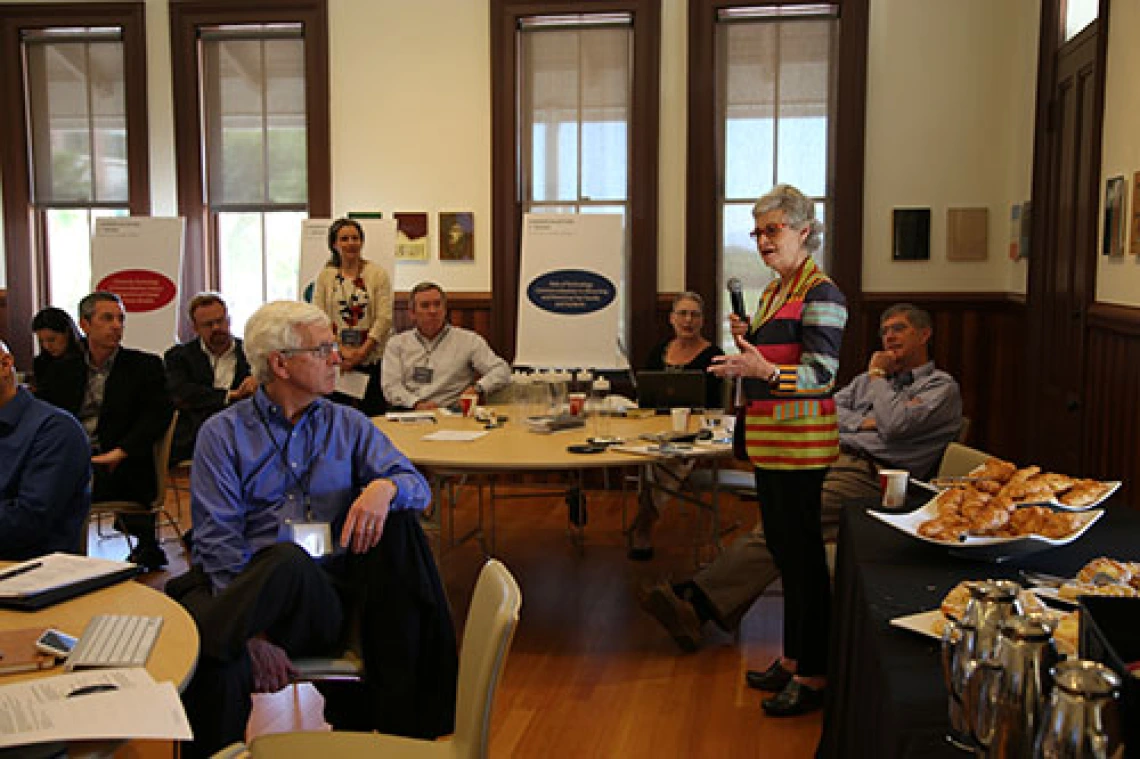Commercialization By Design

Tech Launch Arizona Hosts Summit of Leaders to Advance the Impact of Innovation
Tucson, Ariz. - The process of taking inventions from university research and turning them into patents that can be converted into products and startup companies is long and complex. Given the uniqueness of each university's research environment and its surrounding ecosystem of businesses, alumni, donors and entrepreneurs, nailing down "best practices" is not easy, either.
But this week, Tech Launch Arizona, the University of Arizona's office dedicated to commercializing the inventions born of the University's labs, took the lead and hosted a conference of experts in technology commercialization from across the country.
"Commercialization by Design," drew more than 40 of the brightest minds in the field and met for two days at Old Main on the UA campus. The results of the discussions will be published in an upcoming volume of Advances in the Study of Entrepreneurship, Innovation and Economic Growth. The series is co-edited by Sherry Hoskinson, director of the Wheelhouse at TLA.
Talks at the conference focused on four specific topics, each corresponding to a different paper in the upcoming volume: how technology commercialization impacts the environment for research; its importance and role in attracting and retaining top faculty and students; its impact on regional and global economies; and how to best measure such impact.
"Technology commercialization has been measured in terms of numbers, such as invention disclosures and licenses," Hoskinson says. "Together with this amazing group of people, we’re learning that alongside traditional the commercialization perspective, broadening our approach to optimize the university’s intellectual property can translate to even more meaningful valuation."
"It’s more than just achieving traditional metrics," she says. "We need to understand what’s important to all the stakeholders in the ecosystem and address those needs."
The field, known traditionally as "tech transfer," has changed dramatically over the past decade, according to David Allen, vice president of TLA. Through this discussion, he has continued to develop and expand his perspective on all of the factors he and his team can affect through their work.
"With a breadth of engaged people that touch commercialization in multiple ways, through the papers and discussions, we’re able to see the evolving trends and develop solutions for the persistent challenges," Allen says. "This meeting reinforced the notion that a good understanding of all the factors involved – the institution, its faculty and leadership, the community, the network of entrepreneurs and businesses, and the economic forces at play – suggest that we (TLA) are going in the right direction and moving at a pace that’s going to lead to real, broad-based benefits."
A new wave of synergies has emerged, Allen said, and the benefits to stakeholders are many. Commercialization "provides a pathway" for businesses to connect with university-level research and has become a "deliberate outcome."
Under Tech Launch Arizona’s leadership, the UA’s technology commercialization enterprise is thriving more than at any other moment in the University’s history. As discussed in TLA’s 2014 Annual Report and Roadmap Update, the UA recorded 188 invention disclosures, realized $1.6 million in revenues from IP, and spun out 11 new companies. According to a recently released report, the UA Tech Park and its resident companies have an annual economic impact of $2.33 billion on Pima County’s economy. The Tech Park has emerged as a major center for the testing, evaluation, demonstration and application of University and industry-generated technology.
Georgia Tech professors Jerry and Marie Thursby, who attended the conference, are leading researchers who have been tracking university commercialization efforts and performance for the past few decades.
"Does the process of moving technology out of the university and into the private sector — which also requires faculty to continue helping the firms — does that reorient the university?" Jerry Thursby asks. "To date, we can't see evidence that this has changed the fundamental culture of universities."
As Marie Thursby says, "Researchers gain from practitioners and vice versa. It's an interesting dialogue."
The following people were in attendance:
- Dave Allen, The University of Arizona, Tech Launch Arizona
- Lorena Archundia, CONACyT
- Jennifer Barton, The University of Arizona, Office of Research and Discovery
- Matt Bell, Cultivian
- Bruce Burgess, Entrepreneur in Residence, The University of Arizona, Tech Launch Arizona
- John Buttery, Executive in Residence, The University of Arizona, Tech Launch Arizona
- Tom Byers, Stanford
- Michael Cassidy, Georgia Research Alliance
- Richard Chylla, Michigan State University Technologies
- Teresa De Leon, CONACyT
- Fred Farina, Cal Tech
- Luis Felipe Beltrán, Mexican Technology Transfer Offices Network
- Tannya Gaxiola, The University of Arizona, University Relations
- Harry George, Solstice Capital
- Sherry Hoskinson, The University of Arizona, Tech Launch Arizona
- Jacob Johnson, Innovosource
- Chris Kaselemis, City of Tucson
- Carol Mimura, Cal Berkeley
- Mitzi Montoya, Arizona State University
- Ken Nisbet, University of Michigan
- Mary O’Reilly, Science Foundation Arizona
- Brian Ritchie, University of Utah
- Matt Rubin, Indiana University
- Donna See, Allied Minds
- Nick Stanbury, ABOR AVP for TT
- Ashley Stevens, Boston Univ Retired
- Kate Tallman, University of Colorado
- Manny Teran, Aztera
- Jerry Thursby, Georgia Tech
- Marie Thursby, Georgia Tech
- Eileen Walker, Association of University Research Parks
- Justin Walker, University of Arizona, College of Optical Sciences
- Jan Youtie, Georgia Tech

